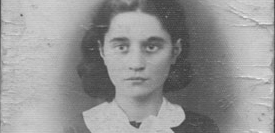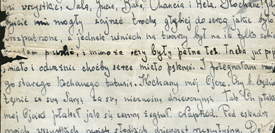Prewar Jewish Life and Deportation
 Sala Garncarz, 1936
Sala Garncarz, 1936
Sala Garncarz and her family lived in Sosnowiec, an industrial city of 130,000 in Upper Silesia, Poland, a region noted for coal mining and manufacturing. The Jewish community of 29,000 was largely self-governed. Jewish organizations managed social services such as hospitals, schools, burial societies, and orphanages.
In addition to small businesses, Jews owned real estate and export and manufacturing enterprises. Religious practices ranged from Hasidism to modern “Progressive” Judaism. Diverse political parties, youth groups, and Zionist organizations flourished. Sala’s father, Joseph Garncarz, taught Hebrew. Her older brothers and sisters operated sewing and shoemaking machines in their homes. Sala and her sister Raizel were the first in their family to attend Polish public schools and Bais Yaakov, the first formal school for Jewish girls in Poland. They spoke Polish at public school, but Yiddish was the language at home and at Bais Yaakov, where they also learned Hebrew.
Germany invaded Poland on
September 1, 1939. Sosnowiec was close to the German border and was occupied
by September 4. Five days later, the Nazis burned the Great Synagogue.
In the days and months that followed, Jews were constantly harassed and
terrorized in their homes, schools, businesses, and synagogues.
 “Goodbye, everybody; remember me, only please do not
“Goodbye, everybody; remember me, only please do not
pity me, because nobody forced me to do this.”During German occupation, the nimble Sala proved
herself invaluable in scouting the town, renamed Sosnowitz by the Germans,
for more rations.
Then, in the fall of 1940, Raizel was ordered to report to
a Nazi labor camp. Sala, two years younger, volunteered to take her place, believing that the timid,
pious, intellectual Raizel would find it harder to adapt.
Their parents acquiesced, never suspecting that the six weeks of required labor would become
five years of slavery. On October 28, 1940, Sala and her
mother joined hundreds
of Jews at the Sosnowitz train station. A well-dressed woman
in her 30s saw the family’s distress and offered to help. The woman, Ala Gertner, promised to take care of 16-year-old
Sala, and together they boarded the train to the Geppersdorf labor
camp.
For the next three years, in person or through letters, Ala kept her promise.
View section images